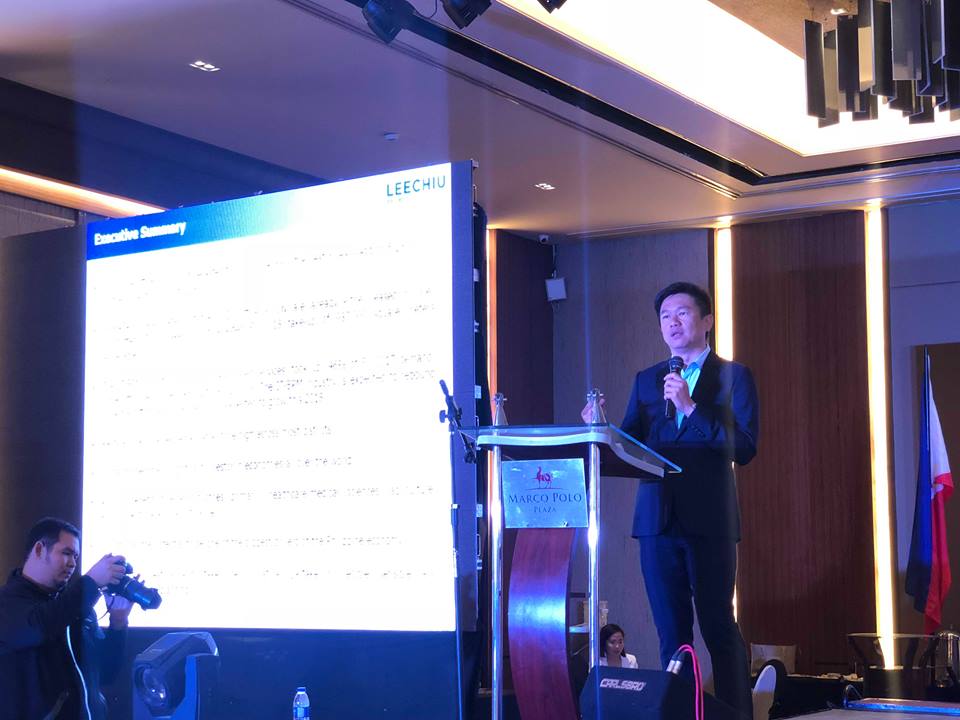
David Leechiu, CEO of Leechiu Property Consultants, discusses the issues about the property sector during Friday’s 9th National Convention of the Organization of Socialized and Economic Housing Developers of the Philippines (OSHDP) in Cebu.
CDN PHOTO/JOSE SANTINO BUNACHITA
There should be more Philippine Economic Zone Authority (PEZA) zones in the provinces to attract more investors especially in the business process outsourcing (BPO) industry in areas like in Cebu.
David Leechiu, chief executive officer of the Manila-based Leechiu Property Consultants, said this amid what he called a backlog of buildings which were still waiting to be accredited by PEZA.
According to Leechiu, data the company gathered showed that 31 office buildings in provincial areas like Cebu and 20 office buildings in Metro Manila were in this situation.
He said that once provincial areas could develop more townships or business parks with PEZA accreditation, then confidence of investors especially from the BPO industry in their expansion could shoot up to 60 to 70 percent.
“We need to grant more PEZA zones in the provinces. There’s a long list of companies that want to go to the provinces. They want to develop properties in the provinces but cannot get confidence to do so without PEZA accreditation,” Leechiu said during the 9th National Convention of the Organization of Socialized and Economic Housing Developers of the Philippines (OSHDP) in Cebu last Friday.
He said that PEZA accreditation would be needed for BPO investors, who would be looking for more PEZA zones, for their expansion plans.
He encouraged developers to get PEZA accreditation for their coming office space projects and put pressure on the PEZA to promptly approve pending applications.
“We all need to speak with one voice. There’s a long backlog of buildings waiting to be accredited by PEZA. It’s either in the desk of the President or somewhere between PEZA and the Office of the President,” he said.
CIB.O exec
Wilfredo “Jun” Saa, executive director of the Cebu IT-BPM Organization (CIB.O) agreed with Leechiu on the observation about the delays in PEZA accreditation of buildings.
Saa said that he had noticed that it would take longer for developers to get PEZA accreditation of their building projects in the Duterte administration as compared to accreditation approval time of previous administrations specifically during President Gloria Macapagal-Arroyo’s and President Benigno Aquino III’s administrations.
He said that during President Arroyo’s time it was really fast and in President “Noynoy” Aquino’s time it was just at the right pace.
He, however, said that he learned from PEZA officials that the delays on the approval of the applications were not on their end but on the Malacanang side.
“We’ve heard a lot of stories about this. But what we know is tua ni masangit sa Malacañang. As to the reason for the delay, that I don’t understand, and that I don’t know,” Saa said.
He also said that getting PEZA accreditation would now be the challenge for developers especially for their new building projects.
He also confirmed Leechiu’s statement that a PEZA-accreditation had been one of the primary considerations by investors in the information technology (IT) and BPO industry when expanding to the provinces.
POGO sector
Aside from the PEZA accreditation issue, Leechiu also tackled the Philippine Offshore Gaming Operators (POGO) sector, which he described as the sector that had driven up demand for office space in Metro Manila and provincial areas like Cebu.
“We’re comfortable and cautiously optimistic about the office market in Metro Manila. If not for POGO and the gaming market, the property market would have crashed two years ago,” he said.
In 2016, the consulting firm noted that the POGO sector was only taking up 7 percent of the office demand in the Metro Manila.
Up 30%
By end of 2017, however, it has gone up to 30 percent, almost as big as the BPO sector. The POGO is now the second largest driver of office space in the market.
“It is happening in Cebu and many parts of the Philippines, even in the most remote areas. And they’ve become a transformational factor for the good. They infuse money to the local community,” Leechiu said.
So far, for the first half of 2018, the POGO sector has already recorded between 15 to 20 percent of total office space demand in Metro Manila.
But Leechiu said this would be expected to rise as most transactions for office space would happen within the last five months of the year.
1M square meters
In Cebu, the consulting firm said the office space supply is around 1 million square meters. At least another 519,000 square meters are expected to be constructed within the next six years.
A lot of the supply coming online is still within the Cebu I.T. Park and the Cebu Business Park.
“Demand in Cebu has been fantastic by far. Vacancies are back to very low levels. Last year, it was at 90,000 square meters. But for the first three months of this year, it was at 9,000 square meters. The BPOs and POGOs continue to come in,” Leechiu said.

